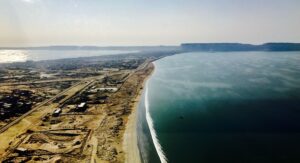by Sulaiman Mueez 9 April 2023
Tourism has always been an important economic factor for ports and coastal towns. Connecting water bodies and marine activity drives the trade on these land parts. They also serve as an anchor of sustainable livelihood for people living in these parts. Trade, fishing and tourism are important economic activities for coastal communities to generate wealth. In modern times, the beaches and coastal attractions are pivotal elements for states to generate income. That is why many states like Turkey, UAE and East Asian states that have beautiful beaches and coasts spend a lot of advertisement to attract foreign nationals and investment. Tourism contributes considerably to their collective GDP.
Pakistan has a diverse geographical landscape, touching at extreme north the Himalayas and stretching the long shore of Arabian Sea. It has lavishing green fertile lands of Punjab, a vivid desert, river shoring from mountains and host world’s third largest collection of glaciers that provide clean waters for its rivers. These attractions are important tourist points for both Pakistani people and foreign nationals. Tourism economy could provide Pakistan a substantive substitute to industrial or agro-based economy where multiple factors downplay the development in these sectors. Tourism brings foreign direct investment, promote soft image of country in diplomacy and increase surplus by bringing business to these areas. It also reduces the burden on urban establishments when rural community start settling in big cities for employment and opportunities.
Tourism is the leading economic driver for many states. For example, tourism makes up 11% of Turkey’s total GDP and alone generated $44.3 billion dollars with contribution from 44 million visitors to the country. These numbers indicate a substantial economic activity out of just tourism. The number of jobs Turkey creates from tourism also generates a lucrative employment cycle. In 2021, Turkey created 2.4 million jobs while in 2019 it was 2.6 million and despite the covid pandemic in 2020 the employment cycle still stood at 2.1 million. Pakistan can also utilize its beautiful landscape and terrain for tourism purposes like Turkey. The mountains and valleys in Balochistan are also a good spot for various tourist activities like sailing, paragliding and hiking in natural steeps and beautiful meadows. The waterfalls and ancient ruins add to its majestic allure and glamor to its natural habitat.
Gwadar is a port town at the southern end of Balochistan province, adjacent to ever expanding Arabian seas. This location provides Gwadar a very prominent importance in maritime trade routes. The coastline of Gwadar stretches to 600 km. Such a long coast serves as an anchor for important maritime trade and shipping business, it also provides important tourist attractions. The mountainous range of Balochistan that dwells into deep valleys, deserts and beaches are few of the most beautiful places for tourism. Kund Malir Beach, Omara Beach, Koh-e-Batil, Sphinx of Balochistan, Gwadar desert, Astola are one of the few places worth exploring. The region is home to ancient civilizations and societies that have flourished here for millennia. This rich history extols the beauty of this region that attracts many tourists annually to places like Hana Urak Valley, Hingol National Park etc, yet there is a lot of potential still left to explore.
In order to promote tourism in Balochistan, Gwadar Master Plan was designed in 2007 to lay down the foundation for the development. It was a 40-year road map that would systematically establish the Gwadar zone to promote tourism, build industrial complexes and tourist attraction sites. GDA recently approved a Gwadar tourism policy through their governing board. This policy enunciated the construction of eco-resorts, restaurants and necessary infrastructure to sustain tourism. In 2019, Prime Minister Imran khan highlighted the promotion of tourism as the main priority of income that would create jobs and generate national wealth through the effective use of foreign investment in mega tourist projects. Pakistan also introduced a policy to provide on-arrival visas to attract tourism and soft-image of the country.
Yet despite initial steps taken to promote tourism, especially Balochistan and Gwadar, there has been no coherent national strategy in place between the federal and provincial governments. Pakistan failed to capitalize tourism in international markets despite the early enthusiasm in depicting CPEC and Gwadar as turning points of Pakistan’s economy. After the 18th amendment was passed, the federal ministry for tourism was abolished and even provinces have failed to establish proper mechanisms to channel the tourism marketing. Lack of resources and fund embezzlement is another problem to install the proper channels.
Stimulating tourism in Gwadar can solve many problems Pakistan is facing right now like unemployment, stagnant economic development, political instability etc. Enunciating the work on tourism project by building the necessary infrastructure and channeling the resources could provide great incentives to national and international real estate markets. Establishing roads, marketing the tourist spots and resorts, national highway and rest points could as simply solve Pakistan’s unemployment problem. This massive project could provide opportunities to every industry in Pakistan, from engineering to liberal arts, marketing and advertising, managing the large-scale business administration, building the roads and other infrastructure are some of the very lucrative prepositions that Pakistan can monopolize to attract foreign investment and utilize its own human resource. Pakistan can also work on establishing mutual technical assistance with other countries to provide better tourism facilities. It is impertinent that Pakistan takes precedence in the Gwadar/Balochistan project in the face of increasingly deteriorating economy and food security. Inflation and receding currency value in the last year has worsened, depleting our foreign reserves. This shortage of resources has also affected the development process in Gwadar. Government needs to put forward a national strategy to establish communication between federal and provincial authorities. There is also a need to engage the private sector, coastal communities and government institutions to cooperate to provide the necessary framework for future endeavors.

